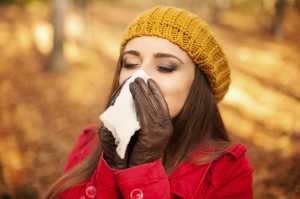Do You Have Fall Allergies?
While many associate the spring with allergy problems, the fall season can be just as problematic. There are different triggers for fall allergies, and they can create many symptoms for those suffering from allergies. Below are a few facts about fall allergies that may help you understand more about what causes them.
- Ragweed is one of the main contributors to fall seasonal allergies. According to the American College of Allergy, Asthma and Immunology (ACAAI), ragweed pollinates from August until November, until our first hard frost. Research suggests the season lasts up to three weeks longer than it used to. A single ragweed plant may release 1 million pollen grains in just one day, and one grain may travel up to 100 miles! Warmth, humidity, and wind all help ragweed pollen travel by air.
- Mold is another common allergen in the fall. Mold is a fungus which makes spores that float in the air like pollen. Indoor molds grow in places with moisture, such as bathrooms, basements, and kitchens. Outdoor molds can grow on rotten logs and fallen leaves. According to ACAAI, molds can be especially bothersome during the fall season. Unlike pollen, mold doesn’t die with the first frost, spores simply stop growing.
- Dust mites are common in the fall, not just in the summer months. Dust mites are tiny, microscopic creatures that can be found in bedding, cloth, and carpet. They are hardy creatures that thrive in humidity, therefore increasing in population during the fall season. Activities such as vacuuming, sweeping, dusting, or disturbing bedding make dust mites temporarily float into the air and they are easily breathed in. This can cause allergy symptoms such as sneezing, runny nose, or nasal congestion.
A new school year can trigger fall allergy symptoms. While many allergies are associated with the outdoors or the home, dust mites and mold tend to thrive in school environments. Animal dander, either from classroom pets or carried in on classmates’ clothing may trigger allergy symptoms.
What to do About Your Fall Allergies
If you are experiencing fall allergy symptoms, it is best to consult with an allergist, who can determine the exact cause of your allergies and formulate the best treatment plan to suit your individual needs. While there are over-the-counter medications available, self-diagnosing often results in only temporary relief, rather than long-term management.
Allergy & Clinical Immunology Associates has been serving the needs of Pittsburgh’s allergy sufferers for over 40 years, with a team of board-certified specialists on-hand to address the unique needs of each and every patient. Their state-of-the-art Allergy Clinic in Pittsburgh provides the highest possible quality of care to those with allergic diseases, asthma, and immune deficiency disorders. More than just an allergist, the caring and professional staff at Allergy & Clinical Immunology Associates strives to help each patient achieve a happy, symptom-free life.
For more information on their Allergy Clinic or allergy and asthma care, contact them today to set up an appointment at your convenience.
